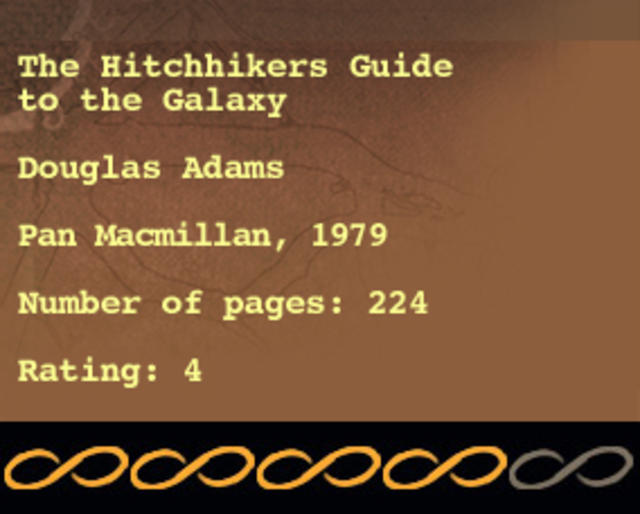A Review of: The Hitchhiker’s Guide to the Galaxy
The Hitchhiker’s Guide to the Galaxy is a comic science fiction novel about the intergalactic adventures of two humans from Earth: Arthur Dent and Ford Prefect.

This novel is the first in a series written by Douglas Adams. It was an adaptation of a radio comedy broadcast by Adams on the BBC and was later made into a movie, a television series, a computer game, and a comic book. The book has had a mass appeal since its publication in 1979, with references that have been incorporated into many aspects of popular culture.
The most appealing aspect of The Hitchhiker’s Guide to the Galaxy is Adams use of gallows humor. Gallows humor is a type of humor that still manages to be funny in the face of a perfectly hopeless situation. It’s a kind of humor that a character has when he or she knows something awful is about to happen and there’s nothing they can do about it. Here’s an example of gallows humor from the novel: “If we’re unlucky, the captain might be serious in his threat that he’s going to read us some of his poetry [before he throws us into space]…” Whether or not the captain reading poetry to the two protagonists, Arthur Dent and Ford Prefect, is truly a harmful thing, the simple wording of the quote makes the reader laugh out loud at the thought of poetry being a viable and frightening threat. Quotations like these make the reader ask an absurd question before turning the page to find out the answer — in this case, What makes the captain’s poetry worse than being thrown off a spaceship? While the book may not make everyone laugh, the completely off the wall questions are what’s funny.

The second thing that makes the book so popular is Adams’ factual style of writing and the third person omniscient narrative point of view. As a teacher of mine put it, third person omniscient is exactly like the third person ‘bird’ that sits on a character’s shoulder, except the bird switches between hovering on the characters shoulder and hovering far above the scene. One more important note about the ‘omniscient bird’ — it can see the future.
However, a narrative voice that can not only see into the future, but can also completely tell the reader what will happen next, limits the suspense in the novel.
Spoilers ahead — read at your own risk: In addition, what suspense exists in the book is almost completely negated by the improbable occurrences that rescue the main characters from the conflicts they’re embedded in. I’m not just talking about a single lucky save, I’m talking about two space hitchhikers saved by a passing spaceship a second before they die, a live rocket turning into a whale, and two hostile policeman suddenly having their life support systems explode, saving the group of heroes from certain death by electric gun. Spoilers finished.
Of course, there still is suspense in the book because you never have an inkling that these improbable events keep happening. In my opinion, however, a resolution isn’t as satisfying to the reader if it’s is based on sheer luck alone. Once is fine, but three times is a bit overboard!
Douglas Adams’s use of gallows humor to provoke the reader to ask completely absurd questions, compounded with his easy to read, factual style contributes to the popularity and high quality of this novel. The two shortcomings of the book are the use of the third person narrative voice that lets the reader know things before the characters are aware of them, and the fact that many resolutions are based on luck alone. Some people may prefer reading about resolutions that are improbable and unlikely.
All in all, the book was an almost perfect read and as a review from The Washington Post Book World said, “The Hitchhiker’s Guide to the Galaxy is over much too soon.”

Khalid Husain is a senior in high school. He will attend SUNY Stony Brook next year. He has a deep passion for stories and writing, and an academic passion for the sciences.
